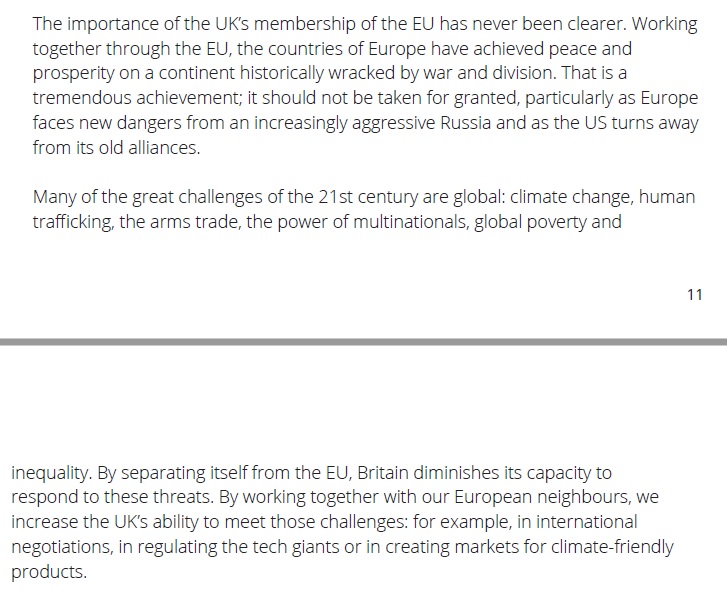It’s manifesto time, which means the efforts to divine more about parties’ positions on things gets underway.
At the best of times, this is a tiresome task, which is why I’m always grateful to those who spend the time coding the texts.
Of course, this is not the best of times in British politics, so the role of the manifesto in the pitch to voters becomes ever more complicated.
Here, I’d like to consider one small aspect of this: European policy.
To be clear, I mean here policy towards the EU and the rest of Europe in the round, rather than just ‘how should we unblock Brexit.’ Membership (or not) of the EU is a big question, but not as big as “what is (non-)membership for?”
I’m going to focus on the LibDem manifesto today, because it’s the one that’s out, and because they are the most unashamedly pro-membership party out there.
What’s their European policy?
The details
Firstly, there’s a lot of manifesto here; 100 pages in total, and most of them full of text.
After the initial blurb, there’s a section entitled ‘Stop Brexit’. This explains that the party will revoke Article 50 if they have a majority, and will push for a referendum and a Remain campaign otherwise.
Most of the section is framed as ‘what would be lost by leaving the EU’, most notably the £50bn ‘Remain Bonus’ (calculated by the removal of uncertainty about membership and the disruption that a Brexit would bring).
But there’s little about what policy would be within a continued membership. Perhaps the only indication is this:

Beyond this, there are the following commitments to EU-level activity:
- Pushing for high levels of environmental protection and animal welfare standards in future EU trade agreements (p.49 & 94);
- Using EU membership to promote ‘values of freedom and opportunity for all’ (p.89);
- Introducing a ‘European Magnitsky Act’ to sanction individuals who abuse human rights (p.89);
- Work with the EU to revive the Iran nuclear deal (p.90);
- Promote democracy and stability in Ukraine and neighbours, using the EU to increase economic and political pressure (p.90);
- Setting an EU-wide net zero emissions target of 2050 (p.94).
And that’s it. Nothing on how the EU functions or its overall objectives. Yes, there’s a commitment to allow EU citizens with 5 years’ residence to vote in all elections (p.87), but that’s not connected to a discussion of European democracy or the democratic deficit.
This rather uncritical position is clearly driven by the logic of Brexit: talk up the positives, focus on the immediate blockage and worry about the rest later. And there is a rest: Liberal Democrats are hardly uncritical of the EU when they focus on it.
But this points to the irony of Brexit: just at the point where a more thoughtful politics and debate about the EU and what its role in building the UK that we want is most relevant, the less we actually talk about it.
And it’s not simply a pro-European issue. It’s systemic. Next week I’m going to write about the pro-Brexit parties documents, but my wild guess is that the focus will be on withdrawal per se, rather than any substantial consideration of what future UK-EU relations should be (beyond ‘friendly’).
And this matters, because we’re likely to find that as the UK does move into the next phase of Brexit, it will be without any meaningful discussion about purpose or policy, but simply more struggles to cope with the crisis of the day., which in turn will engender more crises.
It’s really hard to lift up your head when you’re beset with troubles, but if you don’t then you risk making life even more difficult for yourself.
